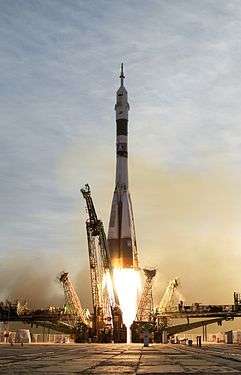Soyuz TMA-5
| Operator | Roskosmos | ||||
|---|---|---|---|---|---|
| COSPAR ID | 2004-040A | ||||
| Mission duration | 192 days, 19 hours, 2 minutes | ||||
| Orbits completed | ~2,900 | ||||
| Spacecraft properties | |||||
| Spacecraft type | Soyuz-TMA 11F732 | ||||
| Manufacturer | RKK Energia | ||||
| Crew | |||||
| Crew size | 3 | ||||
| Members |
Salizhan Sharipov Leroy Chiao | ||||
| Launching | Yuri Shargin | ||||
| Landing | Roberto Vittori | ||||
| Callsign | Tyan-Shan ("Heavenly Mountains") | ||||
| Start of mission | |||||
| Launch date | October 14, 2004, 03:06 UTC | ||||
| Rocket | Soyuz-FG | ||||
| Launch site | Baikonur 1/5 | ||||
| End of mission | |||||
| Landing date | April 24, 2005, 22:08 UTC | ||||
| Landing site | 90 kilometres (56 mi) north of the town of Arkalyk | ||||
| Orbital parameters | |||||
| Reference system | Geocentric | ||||
| Regime | Low Earth | ||||
| Perigee | ~200 kilometres (120 mi) | ||||
| Apogee | ~252 kilometres (157 mi) | ||||
| Inclination | ~51.7 degrees | ||||
| Period | ~88.7 minutes | ||||
| Docking with ISS | |||||
  From left to right: Chiao, Shargin and Sharipov
| |||||

Soyuz TMA-5 was a Soyuz mission to the International Space Station (ISS) launched by a Soyuz-FG launch vehicle.
Crew
| Position | Launching crew | Landing crew |
|---|---|---|
| Commander | Expedition 10 Second and last spaceflight | |
| Flight Engineer | Expedition 10 Fourth and last spaceflight | |
| Flight Engineer | Only spaceflight |
Second spaceflight |
TMA 5 ISS 10 Crew patches were designed by Seán O'Mara for USSR Airspace.
Docking with ISS
- Docked to ISS: October 16, 2004, 04:16 UTC (to Pirs module)
- Undocked from ISS: November 29, 2004, 09:29 UTC (from Pirs module)
- Docked to ISS: November 29, 2004, 09:53 UTC (to nadir port of Zarya)
- Undocked from ISS: April 24, 2005, 18:44 UTC (from nadir port of Zarya)
Mission highlights
25th manned flight to ISS.
Soyuz TMA-5 is a Soyuz spacecraft that was launched on October 14, 2004 by a Soyuz-FG rocket from Baikonur Cosmodrome.
The Expedition 10 crew, Leroy Chiao of the U.S.A. and Salizhan Sharipov of Russia replaced the Expedition 9 crew, Gennady Padalka - Cdr. Russia and Edward Fincke U.S.A.
The launch of Expedition 10 was delayed beyond its scheduled October 9, 2004 launch date. During preflight testing, an explosive bolt was accidentally activated on the Soyuz TMA-5 spacecraft. The resulting damage was repaired prior to launch.
The docking maneuver had to be done manually, as the approach by the automatic system was too fast.
The undocking was done manually as well, as a cautionary measure to save power on a faulty battery.
After 193 days in the station the Expedition 10 crew returned to a soft landing in Kazakhstan together with Italian Roberto Vittori who had flown up with the Expedition 11 crew on Soyuz TMA-6.
References
- 1 2 3 "OFFICIAL PRESS RELEASE about the Soyuz TMA-6 manned spacecraft launch to the ISS". NPO Energia. April 15, 2005. Retrieved December 17, 2008.
- ↑ "OFFICIAL PRESS RELEASE about Soyuz TMA-5 transport spacecraft docking to the International Space Station". NPO Energia. October 16, 2004. Retrieved December 17, 2008.

